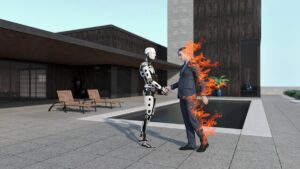CEO… Go: David Dicker on tech valuations, semiconductors, real estate and why there’s ‘no magic formula’ for success

Pic: Justin Paget / DigitalVision via Getty Images
By tech standards, David Dicker has been around for a while (since the “late-70’s”) and he’s seen a few cycles come and go in that time.
The ASX tech firm he founded, Dicker Data (ASX:DDR), stands in contrast to newer tech entrants when it comes to certain operational metrics.
DDR’s half-year results last week showed it booked a profit of $32.09m on revenues of $1.069bn. Consistent with company policy, it paid the entire sum out as dividends.
Post year-end, it also flagged a deal to acquire IT distribution company Exeed Group to boost its footprint in New Zealand.
Dicker will fork out $68m to buy Exeed — all cash.
That again stands in contrast to the most high-profile tech M&A deal of the year — Square Inc’s all-share bid for Afterpay (ASX:APT).
Stockhead caught up with Dicker following the results announcement. And when it comes to M&A he was fairly succinct in his rationale for all-cash acquisitions.
Dicker — all cash, all the time
“That’s the way we like to do deals because it’s a good way to do a deal,” Dicker said.
Elaborating further, he said the Exeed bid actually began as a share-based offer.
“The original offer was for six million shares, and our stock was trading at around $11.40 at that time,” he said.
When DDR shares lost ground and the stock briefly had a $10-handle, the acquisition target “got jittery”.
“There were discussions about whether the volume of shares was tied to the price, and I said ‘no, the deal is 6m shares’,” Dicker said.
“Our shares have a strong history of appreciation but they didn’t like it so in the end we did it organically (all-cash).”
In the interim, DDR shares have climbed higher, which means the company ended up saving money.
“I wouldn’t do anything else with equity. For the Exeed deal all the experts told us we might need to give up 30-40% of the company’s equity to do that deal but we said no, all cash,” Dicker said.
“It wasn’t easy but we did it because it gets you a better result longer term.”
The good life?
Dicker turned heads this week when news emerged that he’d sold down $42m worth of stock in the tightly held company, in which he still holds a 33.6% stake.
Investors got spooked, sending DDR shares more than 20% lower. In response, Dicker addressed the market directly with a letter to the ASX.
Among other details, he happily advised what he planned to spend the money on; a new private jet, funding for his racing car company, and a bit of extra cash to play the US stonk stock market.
Does that means he’s stepping back to focus his energies on the good life?
On the contrary, “it seems that people have read things into this sale that are just not there”, Dicker said.
The share sale “does not mean, in any way, that I am reducing my role or involvement with Dicker Data”, he added.
Shares in the company clawed back some of their losses yesterday, gaining 5.43%.
In terms of what his role is, Dicker told Stockhead he’s been more focused on strategy rather than operations for “a long time now”.
“To be honest, Vlad (Dicker chief operating officer Vladimir Mitnovetski) knows more about stuff than I do. It’s been a while since I’ve been really involved at the technical level.”
“I used to be but what I do now is more strategy, acquisitions and the overall picture.”
On high tech valuations
While it’s a tech stock, Dicker’s profit and dividend metrics more closely resemble an ASX blue chip like Commonwealth Bank or BHP.
That sets it apart in an era when investors have rewarded companies that can drive revenue growth in a loss-making operation.
“We’re a company and companies are supposed to make money,” Dicker says.
“But these things go in cycles. The real problem you’ve got is people who write about this stuff tend to be fairly young.”
“When you’ve been around a while you’ve seen the cycles, and we’re just really in another one like that. Valuations are high, but they’ve always tended to be high,” he said.
“People tend to have a mindset about stocks, bulls and bears. The basic approach is it’s either positive or negative, so nothing really changes in all that.”
“Yes, the fundamentals are crap and the valuations are too high, but we’ve been there before.”
On the global semiconductor shortage
Dicker Data’s core business is as a product distributor for leading IT brands, which it distributes through a network of more than 5,000 resellers.
In the outlook accompanying its half-year results, the company said its model was proving resilient to the global semiconductor shortage, which was triggered by supply chain disruptions in the wake of the pandemic.
For Dicker, it’s about keeping things in perspective.
“Shortages come and go,” he says.
“I’ve been around since the 70s and I can remember disk drive shortages. You’ve just got to work around it. It’s like bad weather — it’s always with us.
“If you look at our sector, some vendors with shortages have more problems because we have a lot of vendors, and others don’t have shortages. It’s more on the periphery for us.
“The other side of it is that it’s more important how we handle the challenge relative to our competitors than how we handle it in absolute terms. So again we just try to deal with it as well as we can.”
Propadee
Along with his preference for making actual profits and paying dividends, Dicker also shared some insights into another of his core capital management strategies; anchor your tech distribution business with good old-fashioned real estate.
“I like anchoring the business by owning the whole building it operates from, which we do with no debt,” he says.
“You could rent the building, but the drawback is it costs you money over time and it makes your equity base smaller so you are vulnerable to any difficulties.
“Owning your own building provides a bit of that asset base which I just like to have,” he said, adding “it’s hard to lose money on real estate”.
The company moved into its new $74m headquarters earlier this year, from its previous office next door.
The move capped off a 40-year period of real estate investing that began in 1983, when the company moved into its first factory. Before that, Dicker worked out of his dad’s office, he said.
DDR bought and sold more properties in 1999 and 2007, before acquiring land to build a purpose-built facility in 2010.
“We developed that building in a period when commercial real estate was weak. But we were in there for about 10 years so we still made a profit when we sold it,” he said. “If we’d rented the premises it just would’ve been $1.5m to $2m in yearly outflows,” he said.
“So we’ve been able to own and fund our real estate holdings all the way through while still paying a 100% dividend.”
It aligns with Dicker’s view that “the purpose of a company is to make profits for shareholders. And if you analyse that further, it means all the profits should go to shareholders.”
“At the end of the day, we go where the tech wins. We’re not a manufacturer, we’re a supplier. We basically blow with the wind and try to position ourselves accordingly.”
“There’s no magic formula. We haven’t got any secrets – it’s just about trying to execute as well as we can.”
Related Topics
UNLOCK INSIGHTS
Discover the untold stories of emerging ASX stocks.
Daily news and expert analysis, it's free to subscribe.
By proceeding, you confirm you understand that we handle personal information in accordance with our Privacy Policy.








